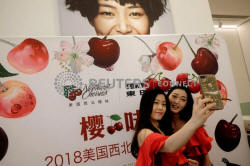The pits: How China's U.S. tariff jab choked a cherry import boom
 Send a link to a friend
Send a link to a friend
 [July 22, 2019] By
Yawen Chen and Shivani Singh [July 22, 2019] By
Yawen Chen and Shivani Singh
BEIJING (Reuters) - For public relations
officer Rachel Li, paying top dollar for "beautiful" cherries imported
from the United States was a no-brainer.
"I heard they are full of iron," said the Guangzhou-based 33-year-old,
"eating them makes me feel healthy, luxurious." Or it did, until Beijing
imposed sky-high tariffs on U.S. cherries and importers took fright,
leaving store shelves bereft and consumers like Li needing a different
fruit fix.
Across China's metropolises, the appetite of a burgeoning middle class
for expensively fresh U.S. cherries has become a symbolic casualty of
China's festering, tit-for-tat trade battle with the United States. A
business that grew to nearly $200 million in 2017 from zero in 2000 has
now withered to little more than a tenth of its volume peak, customs
data shows.
With import tariffs for U.S. cherries set at 50%, Beijing has relaxed
regulations allowing imports from Central Asia - a region that just
happens to be central to President Xi Jinping's epic 'Belt and Road'
infrastructure project, an intercontinental initiative worth hundreds of
billions of dollars.

"It's an opportune time for China to fiddle with the knobs and to do so
in a way that builds economic ties and offers a new market for 'Belt and
Road' partners," said Even Pay, senior agriculture analyst at
Beijing-based advisory firm China Policy.
China's Ministry of Commerce didn't immediately respond to a fax
requesting comment.
May was the last month for which figures were available at the time of
writing, typically the first big month in China's cherry import season.
Supplies from Uzbekistan leapt to nearly half of the May total, Reuters'
calculations show, from zero a year earlier, while the U.S. share of the
cherry import pie shrank to 38% from nearly 80% in May 2018 - and a near
monopoly in May 2017.
But total cherry imports into China by volume have plummeted because of
the collapse of U.S. shipments: 187 tonnes in May 2019, versus 337
tonnes in May 2018 and 1,505 tonnes in May 2017.
Uzbek cherries sell at about 70-80 yuan per kilogram (kg) at retail
level, according to four fruit traders, no more than half the 160 yuan
($23.28) per kg that Rachel Li said she happily remembers stumping up
for her sweet U.S. cherries.
No matter the price, though, the volumes now being shipped in are so
small that Li said she hasn't seen imported cherries for weeks. A search
by Reuters for U.S. cherries at a supermarket and smaller groceries in
downtown Shanghai on a recent weekday came up empty-handed.
'IMPOSSIBLE TO DEVELOP'
For Victor Wang, the China representative of U.S. Northwest Cherry
Growers, it's now a case of trying keep head above water.
Wang said it took 17 years of marketing and government lobbying to help
make U.S. cherries some of the most coveted fruits in China - at one
stage his suppliers were even exporting more to China than across the
border to Canada. But that all changed in 2018, when two rounds of
Chinese tariff hikes added 40 percentage points to import charges.
[to top of second column] |

Models take a selfie during a promotional event of Northwest
Cherries from the United States at a shopping mall in Shenzhen,
China July 8, 2018. REUTERS/Bobby Yip/File Photo

"With such exorbitant costs after the tariff hikes, and impact of a
strengthening dollar, it's impossible to develop the market - we are at best
maintaining it for now," said Wang.
Making life harder, Wang said, is the fact that the association has also
struggled to advertise the U.S. fruit this year. He said many Chinese media and
business partners, including Chinese e-commerce giant Alibaba <BABA.N>, have
declined to provide coverage or to run promotions.
Alibaba confirmed that U.S. cherry promotions were halted but rejected any
suggestion that was related to U.S.-China tensions. It said the move was due to
"market-related factors", including seasons, holidays and unspecified business
opportunities.
"Any speculation tied to the current geopolitical climate is groundless," the
retailer said in a statement sent to Reuters.
(For a graphic on 'China's cherry imports by origin, May 2017-2019' click
https://tmsnrt.rs/2jZrJFi)
'BELT AND ROAD' RULES RELAXED
Just as U.S. supplies shriveled, Beijing has relaxed a requirement for cherries
from 'Belt and Road' partners Uzbekistan and Turkey to undergo up to 21 days of
pre-shipment cold treatment, making exports easier by allowing fumigation as a
pest control measure.
That's opened a trade window not lost on businessmen like Zhu Jianfeng, general
manager of Zhejiang Fishing E-Commerce Co, who said he has been investing in
unspecified projects in Uzbekistan for years and has "very close ties" with the
domestic government.
For the first time this year, Zhu's company imported 300 tonnes of cherries from
Uzbekistan, with plans to boost the volume to 5,000-10,000 tonnes in 2020.

Zhu acknowledged a lack of processing technology in Uzbekistan, saying the
cherries are sent by air and have a shelf life of up to five days; U.S.
cherries, in contrast, last for up to two weeks when transported by air. Zhu
said he planned to help the Uzbek industry upgrade by increasing investment in
production lines.
Back in Guangzhou, Rachel Li said she's switched her quest for health and luxury
through fruit from cherries to avocados. While market data suggests the produce
she's buying is most likely from Peru, Li said she had stopped paying much
attention to where the fruit is from.
(Reporting by Yawen Chen and Shivani Singh; Additional reporting by Beijing
Newsroom; Editing by Kenneth Maxwell)
[© 2019 Thomson Reuters. All rights
reserved.] Copyright 2019 Reuters. All rights reserved. This material may not be published,
broadcast, rewritten or redistributed.
Thompson Reuters is solely responsible for this content. |